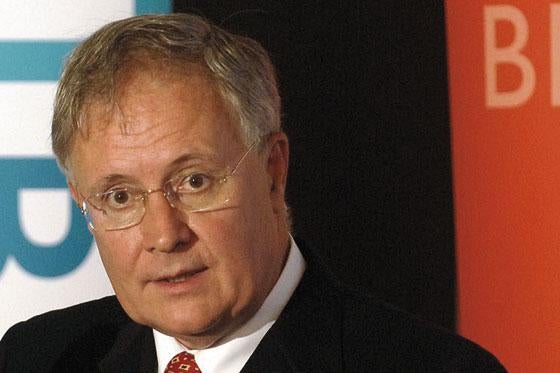
The BBC Trust today condemned proposals to “top-slice” the BBC licence fee contained in the Digital Britain report.
Under proposals unveiled today, the government wants to take 3.5 per cent of the licence fee, or £130m, and use it to fund new regional news consortia which will take over from ITV’s regional news provision after 2013.
BBC Trust chairman Sir Michael Lyons said: “We recognise that there is work to do in reshaping the BBC and ensuring that it is never bigger than it needs to be.
“But we must also ensure that it remains strong enough to sit alongside the other big players in the broadcasting and media landscape: investing in high-quality journalism and other public service content, and supporting the creative economy.
“We have to do this while helping others. That’s why, following a challenge from the Trust, the BBC has come up with an ambitious programme of partnerships to help the wider industry support public service content during tough economic times.
“The BBC will continue discussions with Channel 4 about a possible joint venture with BBC Worldwide that would create value for both parties.”
Lyons added: “The Digital Britain report now raises the question of transferring licence fee money from the BBC to other interests, including regional news organisations.
“On behalf of licence fee payers, the BBC Trust opposes top-slicing. The licence fee has a clear aim, clear benefits, is clearly understood and has stood the test of time.
“Top-slicing would damage BBC output, reduce accountability and compromise independence.
“The licence fee must not become a slush fund to be dipped into at will, leading to spiralling demands on licence fee payers to help fund the political or commercial concerns of the day. This would lead to the licence fee being seen as another form of general taxation. The Trust will not sit quietly by and watch this happen.”
The Digital Britain report proposes using the underspend from the digital switchover help scheme to fund a pilot scheme into the new regional news consortia.
Lyons said that the money could instead be returned to licence fee payers and could amount to £250m, or £9 per household by 2012-13.
On the regional news consortia plan, Lyons said: “There has not yet been a full and open debate about the suggested costs of these services, and it appears that the current proposals have failed to take into account potential sources of commercial funding as well as alternative sources of public funding.
“The Trust’s priority now is to ensure that there is a full and considered public discussion of these proposals because they have profound implications for licence fee payers, for the BBC and for the wider industry.
“Licence fee payers’ voices must be at the centre of that discussion, not least because our work confirms that the public have great affection for the BBC and would not support political or commercial interference which weakens it.”
ITN welcomes action to save ‘crucial services’
However, ITN chief executive John Hardie has welcomed the news consortia plan.
He said: “The continued supply of high-quality, impartial regional news is central to a pluralistic environment and today’s proposals set out the mechanisms to ensure viewers retain this much-valued choice of sources and opinions.
“ITN has a key role to play in the new architecture as the nexus of national and regional news provision, working with local media on the ground to provide enriched broadcast and multiplatform content and to ensure a true competitive alternative to the BBC.
“Those who are shielded from commercial realities should not be allowed to delay this funding intervention and risk damage to these crucial services.”
Liberal Democrat shadow culture secretary Don Foster condemned the proposals to take licence fee cash.
He said: “Maintaining the strength and independence of the BBC is vital. Top slicing – in whatever language – sets a precedence that undermines that independence.
“What guarantees can we have that future governments will not take more money from the licence fee to fund their pet projects, especially when they are unhappy with what the BBC is doing?”
‘Political football’
The NUJ also voiced concern that taking away part of the licence fee would set a precedent and harm the BBC’s independence.
“Top-slicing of the BBC licence fee would undermine the corporation’s independence and put quality broadcasting at risk,” general secretary Jeremy Dear said.
“We agree that funding needs to be found to support news provision outside the BBC, but there are other options that wouldn’t inflict the same damage to the cornerstone of British public service broadcasting.
“Sharing the licence fee with other organisations is the start of a slippery slope towards the politicisation of the BBC. When politicians start to decide how the licence fee is divvied up, the independence and impartiality of the corporation will be put at risk.
“The government has said it will consider other options and that is exactly what it must do. We can’t allow the BBC to become a political football.”
Send your Digital Britain reaction to pged@pressgazette.co.uk or leave a comment.
Email pged@pressgazette.co.uk to point out mistakes, provide story tips or send in a letter for publication on our "Letters Page" blog







